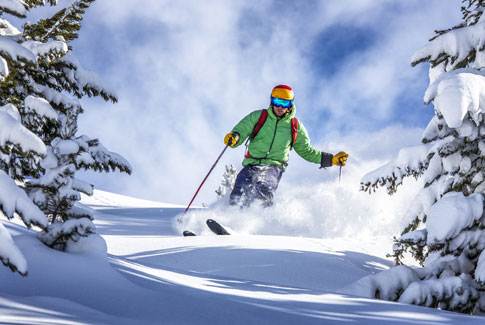Winter sports: How to protect yourself from costly accidents

Winter sports are big and new activities like fatbiking gaining in popularity alongside the perennial favourites, cross-country and downhill skiing, snowshoeing, and skating. But it’s important to prepare properly and protect yourself. We’re not just talking helmets—you need insurance and access to emergency services in case you get hurt.
What are the most dangerous winter activities?
Downhill skiing and snowboarding take the cake. The most common types of accidents are bad falls and collisions with trees or other skiers or snowboarders. Ice climbing is also dangerous—it’s not uncommon to fall several metres. Even less risky activities like snowshoeing can be treacherous if you’re on a mountain or exploring off trail. Of course, you shouldn’t stop being active, but it’s important to be aware of the risks and prepare for them.
Every year, nearly one million people see healthcare professionals for sports-related injuries. Over a quarter of them have serious injuries like broken bones, dislocated joints, and concussions.1 These injuries come with a price tag, which can be a tough pill to swallow.
Are you responsible for ski, snowmobile, and other accidents?

By engaging in an activity, you implicitly accept the common and predictable dangers associated with it. For example, it would be hard to sue a ski resort for a broken bone unless you can prove the resort was at fault (misleading signage, unmarked object on a ski run, etc.). On the other hand, if you hurt another skier in a collision, they could take legal action against you. In such cases, your home insurance liability coverage protects you. Don’t have home insurance? You’d have to pay out of pocket.
Do you have enough coverage for sports accidents?
People who suffer sports injuries take an average of 30 days off work. That comes at a cost. When you start a new sport, find out what kind of coverage is available. Is it covered by your group insurance? Do you belong to a sports association or club that offers coverage? If not, accident insurance, which is available for people age 69 and under, may be a good option.
It covers certain costs that aren’t covered by RAMQ (Régie de l’assurance maladie du Québec), including transportation by ambulance following an accident (some exceptions apply), semi-private hospital rooms, and help to get your back on your feet (benefit for broken bones or reimbursement of physiotherapy expenses) or in the event of accidental death or paralysis.
Did you know that SAAQ doesn’t cover everything?
SAAQ (Société de l’assurance automobile du Québec) only covers snowmobile accidents if you collide with a motor vehicle on a public road. Unfortunately, few people realize that SAAQ doesn’t provide compensation for other types of accidents.
What type of insurance protects sports equipment?
It depends on the situation. If you damage your skis or your expensive fatbike in a fall, you’re out of luck. No insurance will cover the damage.
However, if your equipment is damaged during transport or the skis that you carefully locked on your vehicle’s ski rack are stolen, you’re covered under your home insurance. It covers your property outside your home in the event of theft, fire, or vandalism. But most insurers set a payout limit, so if you have big-ticket item, check with your insurer to make sure your current coverage is enough.
Are you covered if a mountain hike goes wrong?
Do you enjoy forest or mountain activities? It’s important to be prepared. Rescues in these areas are often difficult and require specialized resources like firefighters, police offices (SQ), helicopters, and so on. For peace of mind, it’s well worth your while to take out emergency transportation coverage like Airmedic. A satellite service option is also available. It can come in handy since there’s usually no cellular reception in remote areas. Satellite service can make a big difference, especially in winter when weather is a factor and there’s an increased risk of hypothermia.
Planning to take part in sports activities outside Quebec?
As soon as you leave the province, it’s a good idea to get travel insurance and verify your coverage. Otherwise, you may be in for an unpleasant surprise when you find out you’re not covered for backcountry skiing or mountain climbing. Not all insurance companies offer the same coverage or cover the same sports.
Now you have all the information you need to enjoy winter safely and take part in your favourite sports activities with your family and friends!
__________________________________
1 INSPQ study on injuries sustained during recreational and sports activities in Quebec, 2019.

Cover yourself in the event of an accident
See how you can minimize the financial aftermath of an accident.